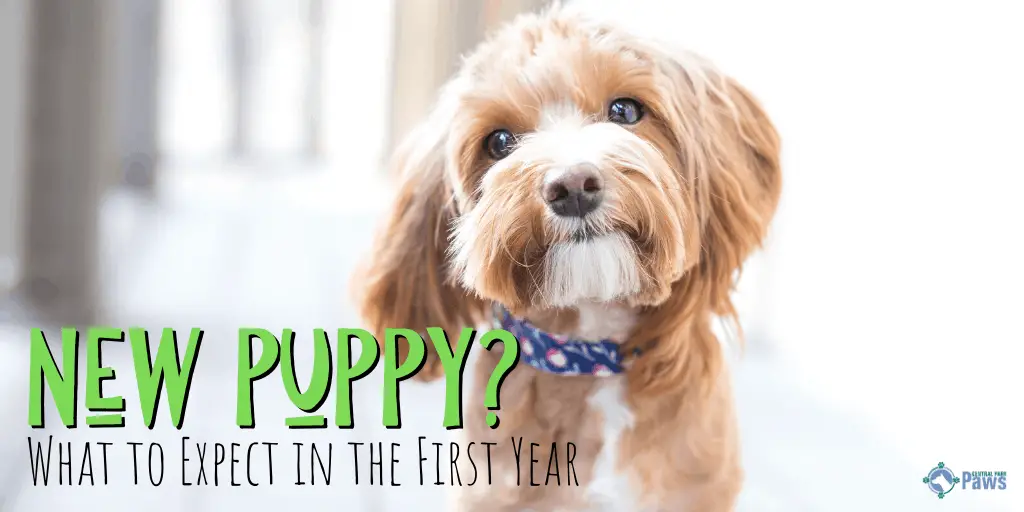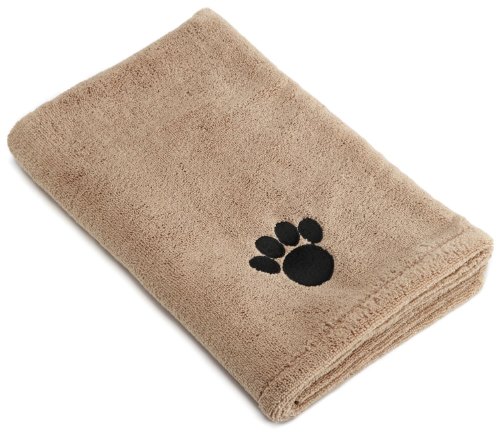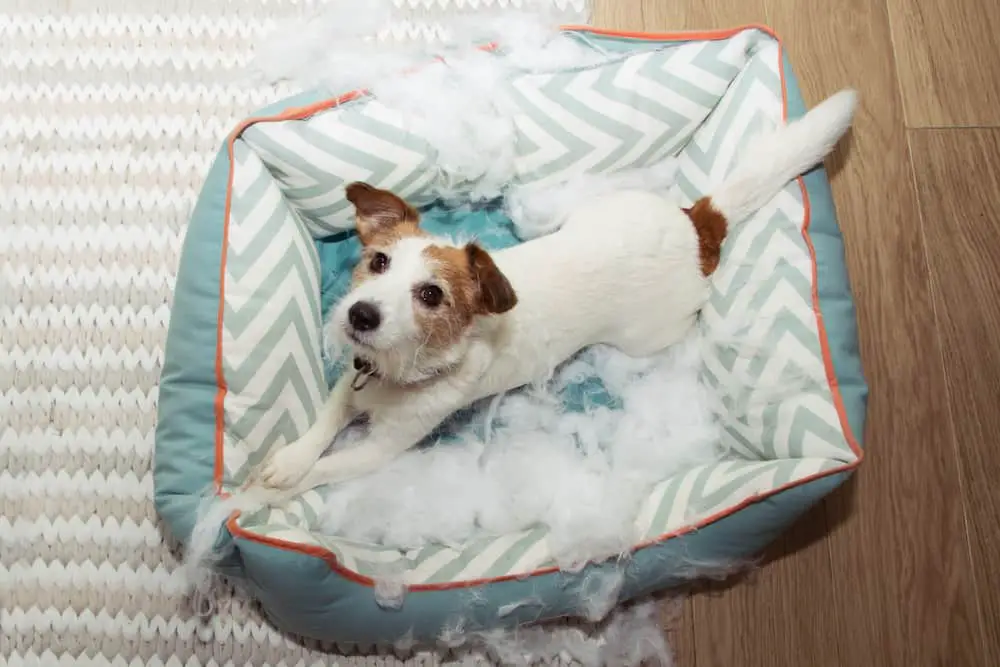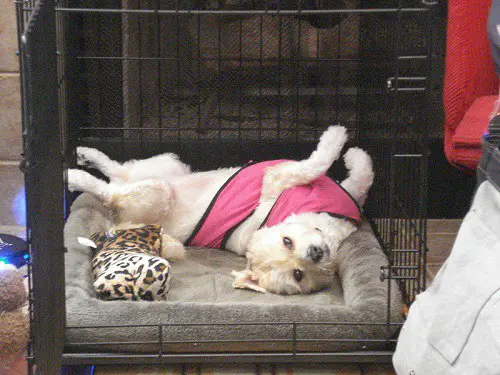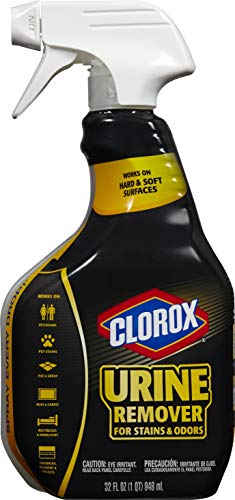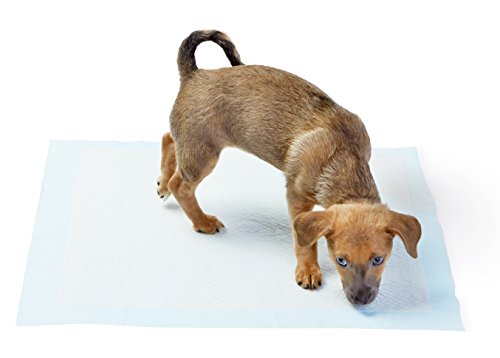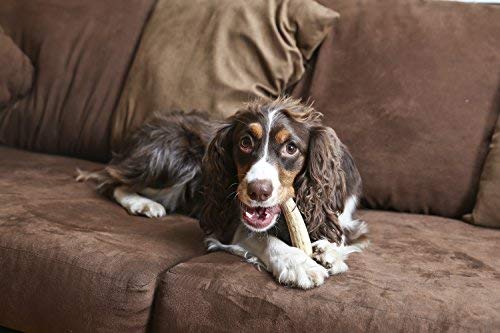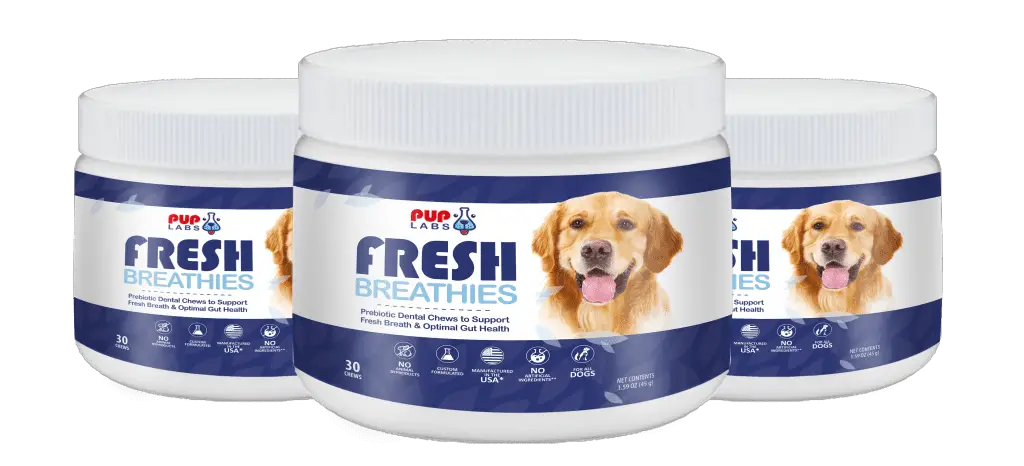The day I brought Daisy home is one of my most treasured memories. I had picked her out at four weeks old and was over the moon the day I was able to pick her up.
So, when the day finally came to pick Daisy up, I thought I was 100% prepared for a puppy.
Oh, how I was wrong!
I had thought that, between my experiences with our family dogs and my work as a vet tech and dog trainer, raising a puppy would be a breeze.
The reality of raising a puppy on your own as an adult and having a family dog as a kid is quite different.
Additionally, having worked with dogs for a few hours a day is not the same as living with them around the clock.
Daisy and Me
I will say it was a very eye-opening experience.
I love Daisy; she will always be my special heart dog.
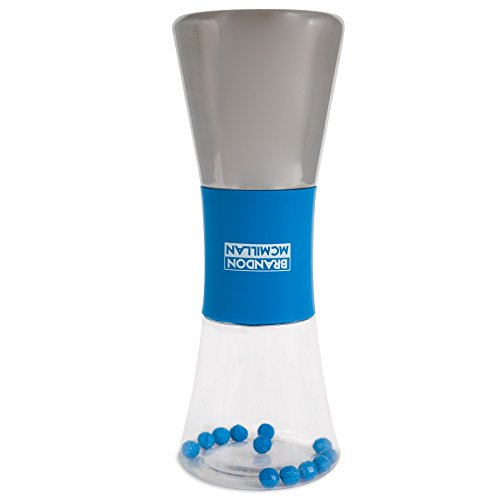
But even after her passing, I still vividly remember the tiny terror she once was!
Daisy was like most other puppies, except she was far more energetic and tenacious. Also, Daisy didn’t always respond to training as I would have liked or expected.
For example, when I tried to use a shaker can, instead of finding it startling she grabbed it from me and ran around with it.
Another thing that surprised me was when I did the puppy yelp when she bit me. Instead of it making her stop biting me she just bit me harder.
I went through a lot of band-aids Daisy’s first year!
Picking up Your Puppy
When the exciting day comes to pick up your puppy, be sure to pack the following:
- Traveling crate and bed or blanket for crate
- Leash and collar
- Towels
- Bottle of water
- Poop bags – Depending on how long your drive is
- Water bowl – Depending on how long your trip is
- Treats
The drive home with your new puppy is likely their first car ride.
Some (not all) puppies will get car sick.
So, it’s good to have towels and water to on-hand help clean up the car and your puppy.
Also, if your puppy seems oddly anxious once you get on the road, they may need to go to the bathroom. Excitement tends to make puppies need to go to the bathroom.
Day 1
Don’t worry, we’re not going through all 365 days.
But the first day is noteworthy enough to have its own section.
When arriving home, the very first thing you should do is let your puppy go to the bathroom. It’s the best time to start your puppy’s housetraining.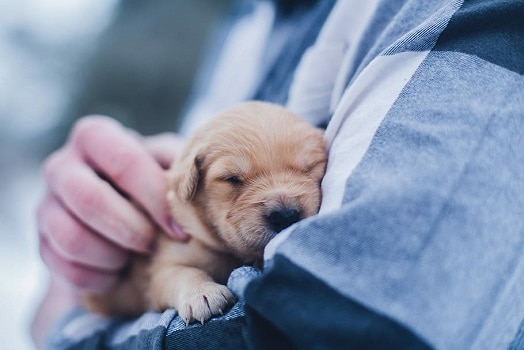
Remember to always have treats on hand when outside so you can reward your puppy every time they go to the bathroom.
Once you get your puppy inside, you may be tempted to let them explore, and that’s great, but keep them on a leash.
Remember my earlier comment on excitement and needing to go to the bathroom?
Once your puppy has settled down, you can let them off-leash in a confined area where you can supervise them.
Allowing your puppy too much freedom can lead to them chewing on inappropriate items or having random accidents.
Throughout the first day and the months to follow, you will want to work consistently on both housetraining (see below for housetraining tips) and crate training.
Also, it is important to introduce them to their kennel throughout the day by tossing fun treats inside; this will encourage your puppy to explore their crate.
By randomly bringing your puppy to their crate it will help bedtime go smoother.
After a fun day with your new puppy, everyone will be ready for bed.
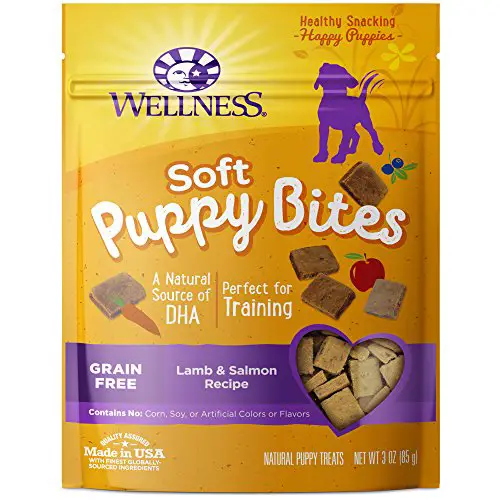
However, even an exhausted puppy will cry in their crate.
Remember, it’s likely this is the first time your puppy will have slept alone without their mom or littermates.
The first night of crate training can be a challenge; okay, well, maybe the first few nights.
Below are a few tips to help bedtime go easier:
- Place the crate in your bedroom
- Provide proper bedding
- Be sure your puppy goes to the bathroom before bed
- Be sure your puppy had enough to eat at dinnertime, but not too close to bedtime
- Place the crate in a quiet, dark area
Though it is essential to allow your puppy to figure things out on their own, if their crying is excessive, you should bring them outside again.
Puppies have a terrible habit of monkeying around outside when they should be doing their business.
Puppy Stages
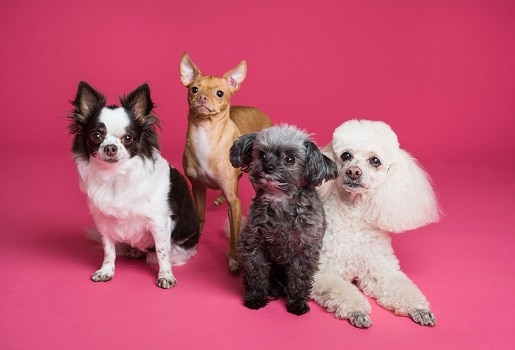
Puppies experience several different learning stages.
It is vital to know each stage and what to expect to ensure your puppy’s mental and emotional needs are being appropriately met.
Because this is such a critical subject, it has been written in greater depth in another article: Puppy Development Stages.
Crate Training Tips
Crate training can be a complicated process for some dogs, but with positive, consistent training, your puppy will learn that crate time isn’t a bad thing.
The Do’s and Don’t of Crate Training
Always:
- Make crate time fun, but not exciting; this is a place that should be associated with calm behavior.
- Always make sure your puppy has had enough exercise before putting them in the crate
- Always bring your puppy out to go to the bathroom before putting them in their crate
- Use treats or toys to lure your puppy in the crate
- Always use a calm loving tone of voice when getting your puppy into their crate
Never:
- Never hit the crate or yell at your puppy when they are crying in their crate
- Never use the crate to punish your puppy for doing naughty things
- Never force your puppy into their crate
- Never slam the door shut on your puppy
Remember: Your puppy’s crate should be a safe place!
Photo by Suzette Franck (CC BY 2.0)
Housetraining Tips
According to the AKC, the lack of housetraining is one of the top reasons dogs are dumped at shelters, which is why it is vital to start house training on day one[1].
Housetraining can be challenging for both the human and the puppy, but if you are patient, consistent, and persistent, you can quickly and easily housetrain your new pup.
Things to remember when housetraining your puppy:
- Always watch for cues that your puppy needs to go outside. Some common signals are intense smelling of the floor, pacing, or sudden pause in play.
- Bring your puppy outside frequently, after they wake up, after they eat, and after playing. In the beginning, you will be bringing them out about every two hours.
- Put your pup on a strict eating, sleeping, and bathroom schedule. Keeping your puppy on a schedule will greatly reduce the number of accidents.
- Take food and water away at least a half-hour before bed or kennel time.
- If your puppy has an accident, don’t make a big deal about it. Just pick your puppy up and bring them out to finish their business.
- If you bring your puppy outside and they don’t go to the bathroom, bring them back in and put them in their crate (not as a punishment) for 5-10 minutes, then bring them out again.
- Puppies are easily distracted, so when you are outside and want them to go to the bathroom, do you best to keep them focused. After they’ve gone to the bathroom you can let them explore.
- Try to bring your puppy to the same place in the yard each time.
- Use a simple command to indicate what you are looking for, such as, “Do your business” or, “Go Potty.”
- If your dog has an accident, be sure to clean the area thoroughly. Otherwise, your puppy may continue to go to the bathroom in that area.
Product Recommendations
- Rocco & Roxie Professional Strength Stain & Odor Eliminator
- Puracy Natural Stain Remover
- Clorox Urine Remover
- Vansky Black Light
Though the last product isn’t a stain remover, it does help locate urine spots and also ensures any urine spots have been thoroughly cleaned.
Related: How to Get Your Puppy to Eat Dry Food
Housetraining and Negative Reinforcement
Puppies will have accidents during the training process, and it’s just part of the training.
Although housetraining can be frustrating, you never want to:
- Discipline your puppy for an accident, including yelling at them
- Rub their nose in the area they had the accident
Negative reinforcement training can prolong the housetraining process and teach your dog to fear you.
Studies have shown negative reinforcement training can cause significant long-term effects such as aggressive behavior, fearful behavior, and anxiety[2].
There is a common misconception that dogs urinate or have accidents because they are upset with their humans.
In actuality, if a dog has an accident, it is likely due to needing to go to the bathroom, anxiety, fear, or stress.
I am frequently asked how long does it take to housetrain a puppy, and unfortunately, I don’t have an answer to that.
Each dog is different, and the amount of time can vary much like the amount of time it takes to toilet train a child.
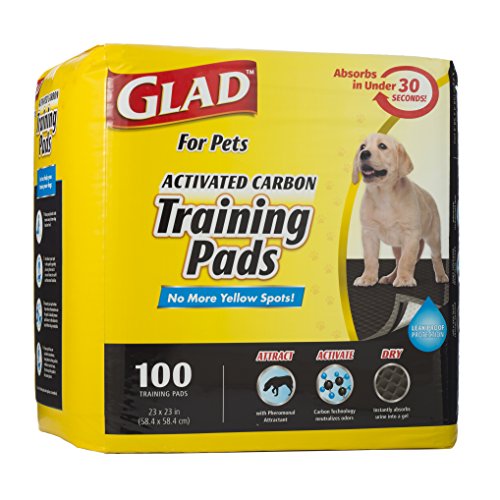
80% of housetraining success is on the human, but the other 20% is all about your pup.
Daisy trained quickly, but because Sophie’s lack of proper training it took forever and she still has the occasional accident.
Stopping Unwanted Behaviors
As your puppy grows, he or she may start do engage in unwanted behaviors.
The most common are:
- Chewing
- Humping
- Nipping, Biting, and Mouthing
Let’s look at why puppies do these and how you can train them to stop.
Chewing
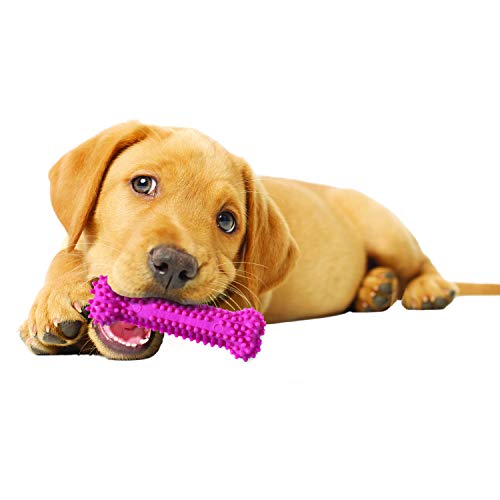
The reason your dog is chewing will help determine how to resolve destructive chewing.
Even with the most diligent puppy-proofing, puppies can still seem to find inappropriate items to chew on from table legs to couches.
Teething
Puppy teething is normal behavior.
When puppies are getting their new teeth in, they often chew on anything within reach. Chewing helps alleviate the discomfort of their new teeth coming in.
Providing appropriate chew toys will decrease the chance of your puppy chewing on things that are not theirs.
Specially designed teething toys that can be put in the freezer to help numb your puppy’s gums as they chew are perfect for any teething puppy.
According to the ASPCA, a puppy’s teething stage usually doesn’t go beyond six months of age[3].
Product Recommendations
Normal Chewing
Dogs of all ages chew.
It’s a normal behavior that helps to keep teeth clean and strengthen jaw muscles.
Ideas for good chew toy options are:
Anxiety Chewing
Even puppies can get anxious or scared, resulting in destructive chewing.
When Calvin was young, he had separation anxiety when not in a kennel ending in the loss of multiple couches and dog beds.
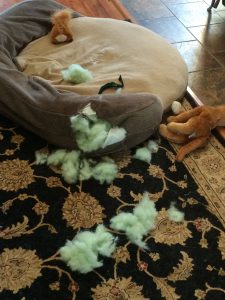
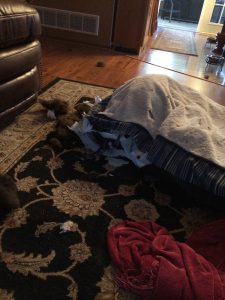
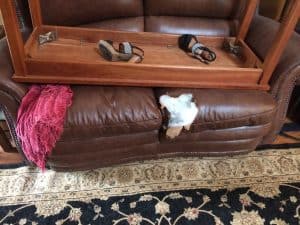
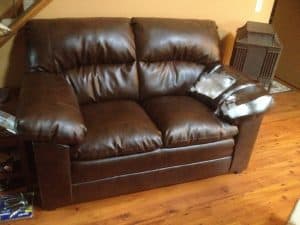
Humping
Many pet parents have witnessed their puppy mounting or humping another dog, object, or human.
Often, pet parents feel a bit embarrassed or bemused by this act.
Humping and mounting are healthy canine behaviors that are frequently practiced at a young age.
Though we see it as a sexual behavior, and it sometimes is, it can also be the result of overstimulation, stress, or dominance.
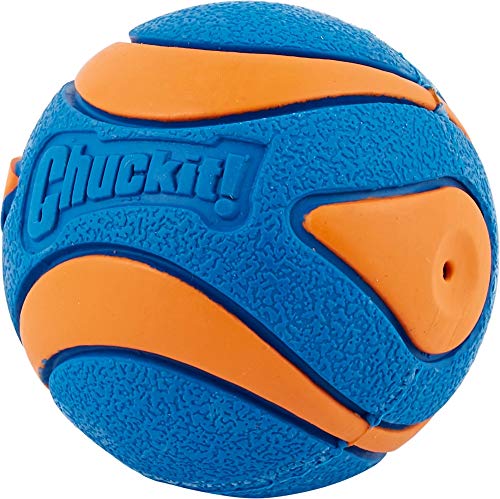
Oftentimes when displayed by young puppies, especially in front of newly arrived guests, it is a sign of being excited and not knowing what to do with all of their excited energy.
Sometimes, humping and mounting is an act to get attention[4]. Pet parents often react strongly to this unwanted behavior, and in a puppy’s mind, even negative attention is attention.
Even though this is a healthy dog behavior, unless you are planning on breeding your male dog when they reach the proper age, it is best to redirect your puppy when they start humping.
The reason why you should put an end to this behavior, besides the uncomfortable feeling it gives humans, is because it can lead to dog fights.
Also, humping is not an appropriate way for your dog to interact with guests.
To deter this behavior, it is best to use redirection techniques.
If a puppy is given too much attention when mounting, then there is a possibility that it will worsen the behavior instead of improving it.
Try grabbing a squeaker ball or other favorite toy.
If you know your dog does this behavior every time you have guests, try giving them a treat ball or chewy when your guests arrive.
Providing a positive distraction is usually all it takes to eliminate this behavior.
Nipping, Biting, or Mouthing
Puppies explore and investigate by mouthing or chewing on things, and sometimes those things are us.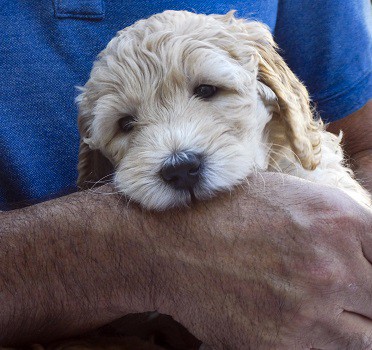
Nipping, biting, and mouthing are healthy puppy behaviors.
When puppies are at play with one another, it will usually involve mouthing and biting one another. However, if play gets too rough you will hear one squeak.
Puppies know that when their sibling or friend yips it means that their roughhousing has gotten a little out of hand and it’s time to be gentler.
Puppies see humans, adult dogs, and other puppies all as possible playmates until they are told otherwise.
My mom’s puppy Gussie learned that her older Golden sister, Gracie, did not appreciate being nipped in the ankles.
Gracie told her quickly and effectively that biting her was not an acceptable way of behaving.
It never happened again.
Since we are not dogs, we need to do our best to figure out a way to set boundaries with our puppies.
It is essential to set these ground rules early and consistently from day one.
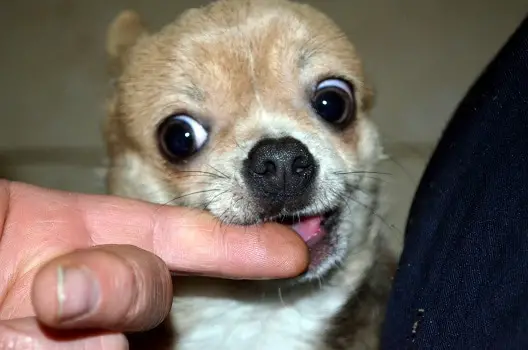
It may seem adorable and harmless when your tiny fluff ball is gnawing on a finger, but remember puppies grow fast, and those teeth will only get bigger and sharper.
One thing I always reminded students in my puppy class was if you don’t want your adult dog doing a specific behavior, then don’t allow your puppy to do it.
For example, if you don’t want your dog jumping on you when they’re 50 lbs. then don’t let them do it when they’re 8 lbs.
Many dogs are surrendered to rescue or left at shelters due to bad behavior, not aggressive behavior.
These dogs just had not been appropriately trained as puppies and are now too big and unruly for their families to keep, which is why it is critical to start training early.
Things to Do If Your Puppy Is Using You as a Chew Toy
- Redirect the behavior.
- Mimic a puppy yelp – This is a signal your puppy understands and it usually ends the biting quickly. At which point, you can redirect.
- Remove yourself from the situation. If your puppy is playing too rough, walk away from the puppy. Your puppy will eventually learn that roughhousing will end playtime.
- Consistency. You need to remember that teeth on skin isn’t okay at any level. So, as soon as your puppy starts gnawing on you, correct the behavior.
- Set up puppy playdates. A tired puppy is a well-behaved puppy. This also lets your dog do its play biting with another dog that enjoys that same style of interaction; plus, it will help with socialization and exercise.
Final Thoughts
Puppies are fun and adorable, and I love nothing more than their soft puppy toes, their silly behavior, and their stinky puppy breath, but puppies are not just sunshine and rainbows.
Puppies can be challenging, and they require a lot of time and patience.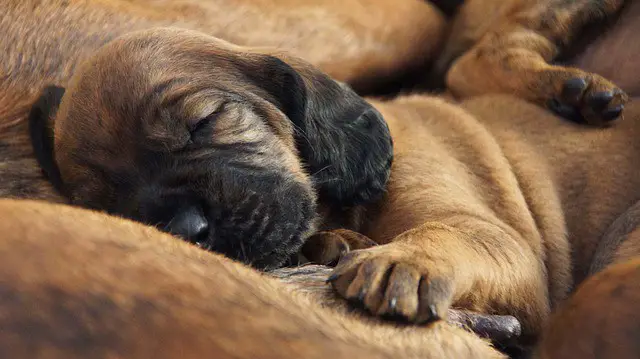
If I could only use two words of advice for parents raising a puppy, they would be patience and consistency.
Without both, puppy training will be a nightmare for both of you.
Do your best to keep a positive attitude, even when faced with horrible puppy messes.
The more patient and consistent you are with your puppy, the faster your puppy will learn, and the two of you can move onto the next stage in your relationship.
Training is a must, but it also has the added benefit of creating a strong bond between the two of you.
You and your puppy are both going to make mistakes, but you can learn from them and move on. Getting a puppy is a beautiful, fun, and challenging journey and so worth every minute.
Resources
- https://www.akc.org/expert-advice/training/how-to-potty-train-a-puppy/
- https://www.companionanimalpsychology.com/2018/05/what-is-negative-reinforcement-in-dog.html
- https://www.aspca.org/pet-care/dog-care/common-dog-behavior-issues/destructive-chewing
- https://www.akc.org/expert-advice/health/why-puppies-and-femal-dogs-hump-or-mount/

